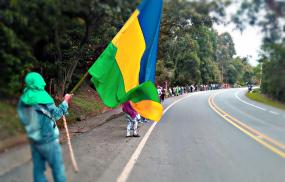One out of every two days the Colombian social organizations denounce the assassination of a militant or activist. These people are those who require the protection of the environment, the best working conditions, the simple observance of laws and their social rights. It is those people who demand that multinational companies in the extractive sector come out of their territories and be guaranteed the return of the land that they had been robbed of, as well as a guarantee of the right to political opposition. The prisons are overflowing and the political prisoners, who are more and more often members of social movements, are victims of judicial arrangements, which will make them spend up to five years in preventive prison before they are finally exonerated. Sara y Tulia Valencia, Milena Quiroz, Alexander Tibacuy, Mateo, Julián Gil, among the many names hiding shattered lives by the policy of persecution of the Colombian State. These offensive methods are combined with a systematic and abusive campaign of repression against the actions of indigenous, peasant and Afro-descendant organizations, as is the case in the Cauca Department since the end of February 2019, or multiple-level attacks on student mobilizations in November and December 2018.
The Government's defence and security plan supported by legislative reforms, such as the reform of the police code and the law of Justice, which aim to confront social organizations in an integral way, accusing them of being linked to the guerrillas, especially to the guerrillas of the ELN which is still active. The Government also accuses the latter of being the perpetrators of the murders of these social leaders, although contradictory, it doesn't seem to disturb them...
In the territories where the ELN is most present, the Government's strategy combines military actions, judicialization of the population and integral social interventions with the aim of de-legitimizing and uprooting social organizations perceived as the fertile ground or the social base of the guerilla. This is the counter-insurgency strategy whereby water is to be drained to catch fish, water being the social fabric in itself of thousands of men and women struggling to organize their territory autonomously.
The denunciations multiply in Arauca, Choco, Sur de Bolívar while the defense plan of the Government has felt. This war of territorial control is rooted in the extractive economic model, which pretends to make Colombia a docile supplier of raw materials at the expense of the life plans of the communities that inhabit the territories.
The Government's policy of "security", which is no more than a war policy, therefore has no intention of enforcing the agreements signed with FARC. While some 50 ex-combatants have been murdered since their reintegration into civilian life, Jesus Santrich, one of the negotiators of the agreements, is awaiting extradition to the United States for charges of drug trafficking while the peasant communities in the conflict zones are awaiting the implementation of the social programs provided for in the agreements.
In addition to sabotage the implementation of the agreements the Government of Ivan Duque decided to sabotage the peace efforts with the ELN guerrilla. After boycotted the negotiating table for more than six months, he announced the end of the negotiations in the media following a military operation of the ELN in a military school in Bogota. However, this decision has never been formally communicated to the ELN and refuses to abide by the international protocols signed by the countries guaranteeing the process-Norway, Cuba, Venezuela, Chile, Brazil and Ecuador.
More than a war against a few thousand fighters, it is a genocide that takes place against the hundreds of thousands of men and women who, on a day-to-day basis, build the foundations of a non-capitalist society and hope to live in peace.
